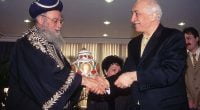Hypocrisy in languages: criticizing Fethullah Gülen, English or Turkish?

Date posted: November 13, 2009
Abdulhamid Türker*
Fethullah Gülen has been the subject of several books and hundreds of articles, in many languages. Some of these books and articles are very critical of Gülen and the Gülen movement (also known as Hizmet movement). If someone wants to understand who Gülen is, the first thing this person would do is to look at the existing literature about him. However, if this person is able to read both English and Turkish, he/she would see two totally different pictures. There is a huge contradiction between the English and Turkish versions of articles critical of Gülen.
If someone looks at these articles in Turkish, he would see someone who is a CIA agent, a US puppet, a hidden cardinal of the Pope or someone working for Zionists. Though there are articles that show Gülen as trying to establish an Islamic state in Turkey, the main argument in Turkish articles is that he is a Western Trojan horse in the Muslim world and trying to either Christianize Muslims or making it easy for Western powers to exploit the Muslim world through his moderate Islamic teachings.
On the other hand, in the English versions of articles criticizing Gülen, he is portrayed as a second Khomeini who is trying to establish an Islamic state in Turkey, or even more grand, trying to resurrect the Ottoman Empire. In these English versions, he is anti-Semitic, anti-Western and trying to Islamize Christians.
This may seem absurd for people who are not able to read both Turkish and English. However, the interesting point is that both versions of the articles mainly use the same sources or are even written by the same people. For instance, Hikmet Cetinkaya, a leading figure in this campaign, wrote a book called “Fethullah Gülen’in Kırk Yıllık Serüveni” (which could be translated as Fethullah Gülen’s 40 year journey). On the cover of the book, a picture of Gülen and the White House stand side-by-side. In another book by Cetinkaya called “Fethullah Gülen, ABD ve AKP” (Fethullah Gülen, US and AKP), the cover features caricatures of Gülen and President George W. Bush, and Gülen whispers to President Bush, “Buddy, I am taking care of it.” Cetinkaya is a journalist who writes for the Cumhuriyet newspaper, and he is known for his critical (to the level of enmity) articles about Gülen. In one of his news pieces, Cetinkaya quotes İlhan Selçuk, editor-in-chief of Cumhuriyet: “Fethullah Gülen, who is living in America, is the vein of Christian imperialism in the Muslim world; while he is playing an oppressed religious role, in reality, he is playing for politics [and] business because he leans his back on neocon evangelists and is controlled by them, money, finance. …”
In the same article, Çetinkaya claims that Gülen is supported by the CIA. To make his point, he gives the example of a school in Arbil, in northern Iraq. According to Çetinkaya, 25 out of 40 teachers working at that school had American passports in 1994. And yet, the same Çetinkaya appears on documentaries in the Netherlands and warns Christian Dutch citizens against Gülen, whom he portrays as a radical Islamist using dialogue to Islamize Christians.
Merdan Yanardağ is also a leading figure in this matter. He wrote several books paralleling the aforementioned claims. In one of his books, titled “Turkiye Nasıl Kuşatıldı?” (How Turkey is Besieged), he claims that the Gülen movement is under the control of foreign secret services, especially the CIA. He further suggests that America is using Gülen and the Gülen movement for its plans in the Middle East and Eurasia (to implement its Greater Middle East Project) and this moderate Islam approach is part of this plan.
While this was the rhetoric and claims that were used to criticize Gülen and the Gülen movement, the same sources are used to paint a totally different picture in English versions of these criticisms. For instance, Michael Rubin (interestingly, a neocon) warns America and Western powers that Gülen will establish an Islamic state in Turkey just like Khomeini. Again, he uses the arguments of the Cumhuriyet newspaper.
Similar to Rubin, Rachel Sharon-Krespin (another neocon) blames Gülen for turning “Turkey away from Europe and toward Russia and Iran and [reorienting] Turkish policy in the Middle East away from sympathy toward Israel and much more toward friendship with Hamas, Hezbollah, and Syria,” claiming that “anti-American, anti-Christian, and anti-Semitic sentiments have increased.” She, like Rubin, uses the same sources (like Cumhuriyet, Çetinkaya, Yanardağ, etc.) to justify her claims.
One wonders how come these critics can contradict each other this much even though they use the same sources. How come they criticize Gülen for being an American and Zionist puppet (Turkish versions) but at the same time as an Islamic danger who is trying to establish an anti-American, anti-Semitic Islamic state (English versions)?
In fact, it is not that difficult to understand because they are addressing different audiences. It makes more sense to warn Turkish speakers of an American imperialist danger which is supported by Zionists. But, on the other hand, for English speakers, you will find more buyers if you use an Islamic danger argument. However, those who can read both languages will see the hypocrisy therein.
*Abdulhamid Türker is a Turkish socio-political analyst.
Source: Today’s Zaman, 10 November 2009, http://www.todayszaman.com/news-192485-centerhypocrisy-in-languages-criticizing-fethullah-gulen-english-or-turkish-bribyibr-abdulhamit-turkercenter.html
Tags: Defamation of Hizmet | Fethullah Gulen | Hizmet (Gulen) movement |
























